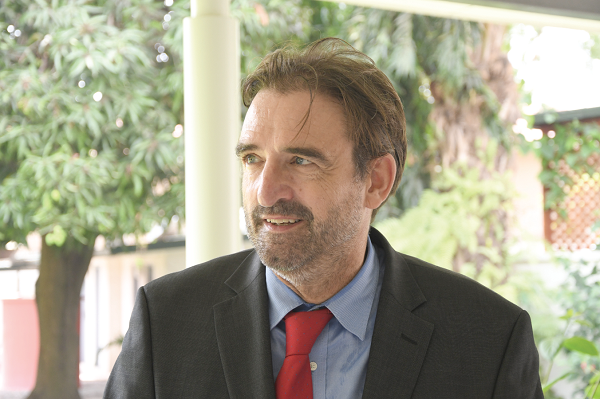The German Ambassador to Ghana, Daniel Krull, has called on businesses with strong business ties with China to use their relationship to encourage and convince the Asian country to sit with other bilateral creditors to agree on a package to help Ghana out of its current economic crisis.
"Time is of the essence. Time is running out. Without an agreement by Ghana’s bilateral creditors, the IMFs package will be difficult," he said.
Mr Krull made the call when he interacted with selected journalists in Accra yesterday on the outcome of the visit of a number of German delegations to Ghana in the past few weeks.
The delegations, which visited Ghana separately, included teams led by the Minister for Development Corporation, Director General of International Labour Organisation, Minister of Finance and Legal Committee of the German Parliament, who interacted with their counterparts in Ghana's Parliament and representatives of some government state institutions.
The German Ambassador also called on Members of Parliament (MPs) who were engaged with China to also encourage the country to sit with Ghana’s bilateral creditors to finalise arrangements to help Ghana to return to economic growth.
China is Ghana's largest bilateral creditor but Mr Krull said: "It is so far not fully supporting the setting up of the creditors’ committee where all the creditors will sit down and agree on a package for Ghana."
Ghana was owing about $13 billion in Eurobonds and $4 billion in bilateral loans in September 2022, according to the International Institute of Finance in a publication on February 4, 2023.
Out of Ghana’s total debt, it estimated that the country owed China about $1.7 billion and the other bilateral creditors were likely to take a deal based on what the Chinese would receive.
Notable among its credits are the $1 billion loan to construct the Atuabo Gas processing plant, as well as a $292 million loan in 2007 for the construction of the Bui Hydro Power Plant.
German interest in Ghana
The German Ambassador said President Nana Addo Dankwa Akufo-Addo and the Minister of Finance, Ken Ofori-Atta, had appealed to the German visitors to support the country in convincing China to come to the table.
“We are ready to do that. We are already in that but what is important is to encourage all Ghanaians who have strong ties with China and are doing business with it to also engage them and convince them that it is time to sit down with all the other creditors to agree on a package,” he said.
The visits by the various German delegations to Ghana, he said, “show how much Germany remains interested in Ghana and is prepared to support it not only in good times but in bad times and a in crisis like this one”.
Mr Krull said Germany was prepared to live up to its responsibility as one of the major bilateral creditors to Ghana “but we are only ready to implement our solidarity if certain criteria are met.”
He said the G20, of which Germany was a member, had agreed on how to deal with such crises and that Germany felt that it was important that the framework was respected.
“We are aware that the framework might not be perfect but it is the only one we have now,” he said.
“Also Germany will be ready to take part in the arrangements when others are also ready. All major creditors must be ready to help Ghana,” Mr Krull said.
“There is an important homework to be done here and we encourage the government to take the necessary steps. With all that together, we are quite confident that Ghana can find a way out of this severe financial crisis,” Mr Krull stated.
He, therefore, encouraged all stakeholders to do their best to decide on concrete measures for creating fiscal space to enable the Ghanaian economy to bounce back.
“Germany is pleased to be part of this process and we are consulting with the government and thinking about setting up a small committee on how to support the government in getting back to economic growth,” Mr Krull said.
Germany, as part of its support, the ambassador said, was working on supporting Ghanaian enterprises to improve their performance and become more competitive through technical and vocational training, which was a strong pillar of Germany’s development cooperation.

